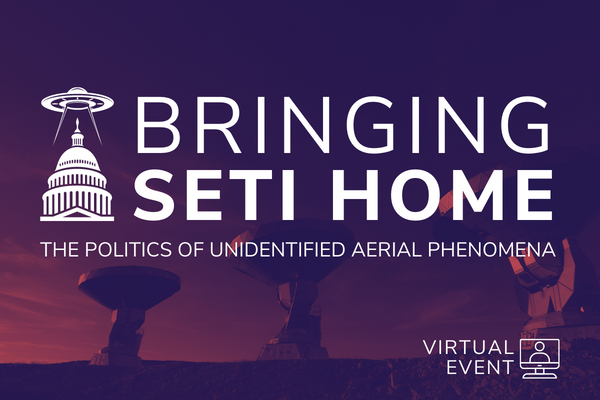
Almost from its inception in 1960, the scientific search for extraterrestrial intelligence (SETI) around distant stars has prompted serious reflection on the potential consequences of success, whether in simply detecting or in making actual contact with ETs. The consensus seems to be that the effects especially of contact would be mostly beneficial, especially if we gained access to new technologies that transformed living standards or helped us deal with climate change. Even religion, one area where serious questions about the risks of contact were raised early on, is now thought to be not so vulnerable after all. Certainly, the Pentagon has never expressed any worries about what SETI might find, presumably because inter-stellar distances are so vast that ETs could not threaten national security or politics even if they wanted to. As a result, while other social scientists have found a home in SETI scholarship, political scientists have been noticeably absent.
This easy, apolitical consensus is challenged by the Pentagon’s Preliminary Report on Unidentified Aerial Phenomena (“UAP,” or what used to be called UFOs), which was published in June 2021, and then quickly implemented in Congressional legislation. After failing to explain 143 out of 144 military UAP cases they were asked to review, the Report’s authors drew three important conclusions: 1) UAP are “probably physical phenomena” (i.e. real), yet unknown; 2) UAP should be studied scientifically, which will require ending the “stigma” attached to them; and 3) UAP exhibit “breakthrough technologies” and thus are a “potential national security threat.”
ETs are never mentioned in the Report, but it leaves a big space for them as a possible explanation of UAP, and the securitization of UAP by the Pentagon is telling. For compared to the “Far”-SETI contact scenario, where distance might protect us, the “Near”-SETI scenario of UAP contact is far more dangerous. If ETs are already here, then we are vulnerable to the almost unimaginable power of an unknown species far more intelligent than our own, power so profound that it could possibly shatter our anthropocentric world even if it were benign or indifferent to us. If political science is the study of power, then here, finally, are the politics of SETI, in the shadow of potential ET power itself.
The Workshop participants of course have no more idea what UAP are than anyone else, and so we will remain agnostic throughout about the Extra-Terrestrial Hypothesis, insisting only that it be on the table as a question. Given that constraint and the past neglect, however, there are still many aspects of the UAP problem where the lens of “politics,” broadly defined, could shed new light. And since there is essentially no literature on the subject at all, rather than try to impose a common framework on the 25 participants – who come from several social sciences, history, philosophy, law, and the SETI community itself – they were invited instead to address whatever political aspects of UAP they were interested in.
As such, our discussion will address but not be limited to the following areas: the politics of naming “UAP;” the ethics of war against ETs; the impact of studying UAP on geopolitics; the role of ideology and worldviews in shaping human responses to UAP; the role of international law in UAP policy; secrecy and strategic ignorance in UAP research; whether UAP policy should be internationalized; the politics of incorporating UAP within a SETI framework; the politics of “dangerous knowledge”; and the role of science fiction in helping us imagine future Contact scenarios.
